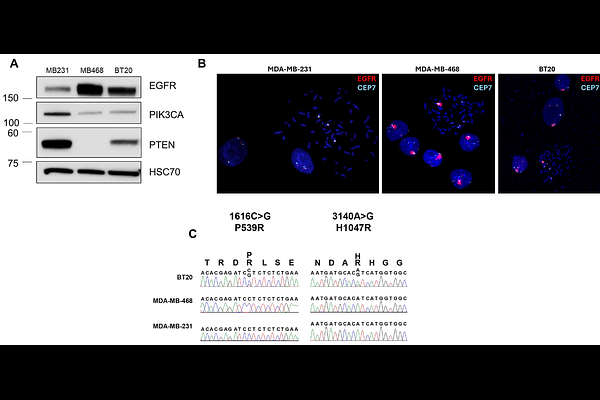Dual inhibition of EGFR and PI3Kinase signaling in EGFR amplified triple negative breast cancer cells induces apoptosis and reduces tumor growth

Dual inhibition of EGFR and PI3Kinase signaling in EGFR amplified triple negative breast cancer cells induces apoptosis and reduces tumor growth
Wisniewski, D. J.; Voeller, D.; Addissie, Y. A.; Deshmukh, S. K.; Wangsa, D.; Wangsa, D.; Heselmeyer-Haddad, K.; Wu, S.; Lustberg, M. B.; Sledge, G. W.; Lipkowitz, S.
AbstractBackground: Epidermal Growth Factor Receptor (EGFR) family signaling is commonly dysregulated in cancer by amplification or activating mutations. We investigated the incidence of EGFR amplification with or without PI3Kinase pathway mutations in breast cancer and whether patients with genetic abnormalities in both pathways can be targeted by dual EGFR/PI3K inhibition. Methods: EGFR amplification and PI3K pathway mutations were studied through data sets from cBioPortal and Caris. We used the triple negative breast cancer (TNBC) cell lines BT20 (amplified EGFR, PIK3CA activating mutation), MDA-MB-468 (amplified EGFR, PTEN deletion), and MDA-MB-231 (no amplification of EGFR or PI3K pathway mutations). EGFR amplification was determined by immunoblot and fluorescent in situ hybridization, and PI3K mutations by sequencing. Signaling was determined by immunoblot, drug synergy by cell viability, cell death by propidium iodide staining, cell cycle analysis by flow cytometry, and animal studies through xenografts. Results: EGFR amplification is found in approximately 1-2.5% of breast cancer patients, more frequently in TNBC (2.45-6.7%) and ER-/HER2+ (1.3-6.5%) breast cancers, and in the molecular basal (2.33-8.1%) and HER2 enriched (1.87-5.4%) subtypes. Overall survival is shorter among patients compared to those with unamplified EGFR. Up to 71% of EGFR amplified tumors have activating mutations in the PI3K pathway. Combination of EGFR and PI3K inhibitors more dramatically reduced mTOR and AKT signaling in the BT20 and MDA-MB-468 cells, whereas the inhibition of downstream signaling was less significant in MDA-MB-231 cells. Combination of EGFR and PI3K inhibitors reduced cell viability in these three cell lines, but inhibition was greater, statistically significant, and synergistic in MDA-MB-468 and BT20 compared to MDA-MB-231. Only MDA-MB-468 and BT20 cells had an increased fraction of apoptotic cells. EGFR or PI3K inhibition alone in a BT20 xenograft model reduced tumor volume, however the combination was the only statistically significant reduction in tumor volume when compared to vehicle control. Conclusions: EGFR/PI3K inhibitor combination causes apoptosis and reduction in tumor growth in cells with EGFR amplification and PI3K alteration. Dual inhibition of EGFR/PI3K presents as a potential targeted therapy in patients with EGFR amplification and aberrant PI3K signaling.